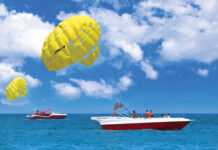By Cindy Mulla, Beach Mosquito Control District
Finally, springtime has arrived in Northwest Florida. Days are becoming brighter and longer. Temperatures are beginning to rise, contributing to the spike in outdoor activity for both Mother Nature’s creatures and for us too.
But what never left and wants to re-establish themselves at your residents before summertime arrives? Curious? Read on. Here is a hint. They are very annoying and can ruin any outdoor fun. One might stealthily arrive on the outdoor scene and before you know the area is swarming with these winged pests. These creatures are here year-round.
Often people think that they die off with the fridged winter temperature. But this is not true. Their development just slows down as they diapause in their current life cycle stage until the weather temperatures rise and they can fully develop into the adult… Mosquito! An example would be the adult Southern House Mosquito. They will seek refuge inside structures warmer than the outdoors. Remember it is the female mosquito that bites because she needs a blood meal to produce 250-300 eggs at a time. Certain mosquito species’ eggs can even last up to a year! The mosquito life cycle has four parts: egg, larva, pupa, and adult. The first three life cycle stages require an aquatic environment. Also, temperature is a key factor for mosquito development. Higher temperatures speed up the stages of development and will amplify mosquito population numbers within a week’s time. With optimal environmental conditions and temperature, the mosquito egg will develop into an adult in one week.
How to prevent the establishment of mosquitos at your place of residence?
Do not wait. Now is the time to become proactive! Weekly, search for any potential objects or areas that can contain, or hold, standing water. Below is a list of common potential outdoor manufactured mosquito breeding sites:
• Bird baths (Flush weekly.)
• Pool covers or tarps (Keep water free or flush with clean water weekly.)
• Rain gutters (Unclog & keep water flowing.)
• Small boats, canoes/kayaks (Store flipped upside-down.)
• Outdoor trash cans (Keep covered or have drainage holes in the bottom.)
• Children’s toys (Dump trucks, sand buckets, wading pools, sand shovels and the list goes on.)
• Coolers, ice chests (Drain and always keep the lid closed.)
• Watering cans, flowerpot saucers & trays (Remove excess water.)
• Wheelbarrow & tires (Store under cover.)
• Swimming Pools/Spa Tubs (Always keep chemicals balanced.)
• Any shape or size of containers (Store upside-down or under cover.)
• Check and fill in areas on your property that hold water.
Remember: “Drain or the mosquitoes will remain!”
Remember to always fight the bite and to prevent yourself from receiving a mosquito bite and the possibility of contracting a mosquito-borne disease. Be responsible every time you go outdoors to work or participate in your favorite activities and wear a registered insect repellent approved by the Environmental Protection Agency (EPA). Repellents do work and are safe to use when following the label instructions.
Remember: Repellent = Responsibility
Most important if you are following all these suggestions and you are still having mosquito problems; do not hesitate to contact your local government mosquito control agency. Your tax dollars fund this important public health governmental entity.
If you live in the Panama City Beach area, from the Hathaway Bridge west to the South Walton County Line and south of the intercoastal waterway to the beaches, contact Beach Mosquito Control District (BMCD) at (850) 233-5030 of find us online at www.pcbeachmosquito.org.
Beach Mosquito Control District was founded on the premise of public health, and safety, and offers innovative technology through Integrated Mosquito Management (IMM). We strive to educate and work with the Panama City Beach Community to prevent the spread of potential mosquito-borne disease while promoting a healthier future.
Remember: Contact Us
Beach Mosquito Control District cannot resolve your mosquito problems unless you contact us. Call (850) 233-5030 or visit www.pcbeachmosquito.org.

















































